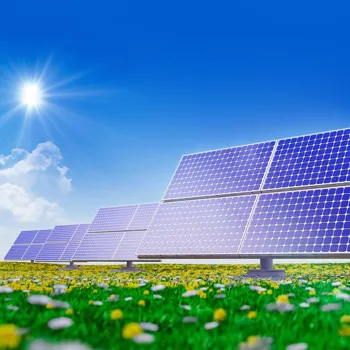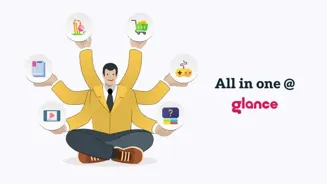Discover 10 game-changing innovations shaping India's future! From green energy to AI education, explore how tech will drive progress. Read more for a glimpse into the next decade's transformation!
India,
a land of diversity and rising aspirations, is on the cusp of a technological revolution. The next decade promises a wave of innovations that will reshape industries, improve lives, and redefine our understanding of ‘what is possible, boss?
’ From sustainable solutions to advancements in healthcare and education, these ten innovations have the potential to propel India to the forefront of global progress.
Green Energy Storage: Powering a Sustainable Tomorrow
India's commitment to renewable energy is immense, focusing on solar and wind power. But their intermittent nature poses a challenge. The next decade will see breakthroughs in energy storage solutions.

Advanced battery technologies, like solid-state batteries and flow batteries, will become more affordable and efficient. Imagine energy harvested during peak sunlight hours being stored to power homes and businesses during the night.
This will reduce our dependence on fossil fuels and stabilize the power grid, ensuring a cleaner and more reliable energy supply for all.
We will also explore innovative ways to store thermal energy, where excess heat from industrial processes can be harnessed and reused, improving energy efficiency across the board.
Green hydrogen production, using renewable energy to electrolyze water, will gain momentum, becoming a key fuel for transportation and industry. The advancement of solar panels is also key here. In effect with higher efficiency solar cells, smaller areas will generate more energy.
Precision Agriculture: Farming Smarter, Not Harder
Indian agriculture is the backbone of the economy, but it faces challenges like water scarcity, soil degradation, and fluctuating yields. Precision agriculture uses technology to optimize farming practices.
Drones equipped with sensors will monitor crop health, identify pests and diseases, and map soil conditions. Farmers can receive real-time data, enabling them to apply water, fertilizers, and pesticides precisely where needed, minimizing waste and maximizing yields.
Imagine sensors in the soil communicating moisture levels directly to irrigation systems, ensuring that plants receive the optimal amount of water, even in arid regions.
Machine learning algorithms will analyze weather patterns and historical data to predict crop yields and optimize planting schedules. This will lead to increased food production, reduced environmental impact, and improved livelihoods for farmers.
Personalized Healthcare: Treatment Tailored to You
The field of medicine is at the brink of a remarkable transformation. Personalized healthcare uses an individual's genetic makeup, lifestyle, and environment to tailor medical treatments.
Advances in genomics, proteomics, and bioinformatics will provide doctors with a comprehensive understanding of each patient's unique health profile.
Imagine, instead of a one-size-fits-all pill, medications are designed specifically for your genetic code, optimizing their effectiveness and minimizing side effects.
Wearable sensors and remote monitoring devices will track vital signs, activity levels, and sleep patterns, providing real-time data to doctors. Artificial intelligence will analyze this data to detect early signs of illness and personalize treatment plans.
This will lead to earlier diagnoses, more effective treatments, and improved patient outcomes. Furthermore, diagnostic procedures such as MRIs will be more accessible with smaller, less expensive machines.
AI-Powered Education: Making Learning More Accessible and Engaging
Education is the key to unlocking India's potential. AI-powered education platforms will personalize the learning experience for each student. These platforms will assess a student's strengths and weaknesses, adapt the curriculum to their learning style, and provide individualized feedback.
Imagine, instead of standardized textbooks, students interact with interactive simulations, virtual reality, and augmented reality tools that bring learning to life. AI chatbots will answer student questions, provide support, and track progress.
This will lead to more engaging and effective learning, especially in rural areas where access to quality education is limited. AI's potential to automate manual paperwork and grades will leave teachers with more valuable time.
Advanced Robotics: Automating the Mundane
Robotics is rapidly evolving, and the next decade will see robots performing tasks in various sectors. In manufacturing, robots will automate repetitive tasks, improve efficiency, and reduce errors.
In healthcare, robots will assist surgeons, deliver medication, and provide companionship to elderly patients. Imagine robots cleaning and sanitizing hospitals, reducing the risk of infections. In logistics, robots will automate warehouse operations, package deliveries, and transportation.
Self-driving vehicles will revolutionize transportation, making it safer, more efficient, and more accessible. This will lead to increased productivity, reduced labor costs, and improved quality of life.
One such example is in space; with Indian scientists working in Space Research, robots will be helpful in automating this process.
Quantum Computing: Unlocking Unprecedented Processing Power
Quantum computing is a groundbreaking technology that has the potential to solve problems that are beyond the capabilities of classical computers. This will see the rise of quantum computers that solve complex problems in medicine, finance, and materials science.
Imagine quantum computers simulating the interaction of molecules to design new drugs and materials. They will optimize financial models to manage risk and predict market trends. They break encryption codes, secure communications, and accelerate various scientific discoveries.
Quantum computing is still in its early stages, but its potential impact is immense. One such use case for Quantum computing is modeling molecule interactions for drug discovery. Further, it will lead to breakthroughs in optimization and AI.
The fusion of these innovations could reshape India's future, creating a more sustainable, equitable, and prosperous society.
Embracing these technological advancements will require collaboration between government, industry, and academia, along with strategic investments in research and development.
These key technologies will help make India more efficient and sustainable.
These technologies have been used successfully in many countries and the current aim is to make India a technological super power by innovating these technologies.
The development of these technologies require the collaboration of the best minds.
The government must also take initiative to involve all parts of the society.
AI Generated Content. Glance/InMobi shall have no liability for the content











